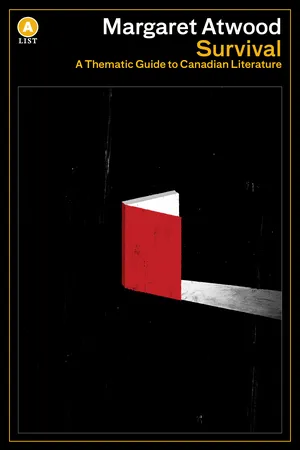
- 328 pages
- English
- ePUB (mobile friendly)
- Available on iOS & Android
Survival
About this book
When first published in 1972, Survival was considered the most startling book ever written about Canadian literature. Since then, it has continued to be read and taught, and it continues to shape the way Canadians look at themselves. Distinguished, provocative, and written in effervescent, compulsively readable prose, Survival is simultaneously a book of criticism, a manifesto, and a collection of personal and subversive remarks. Margaret Atwood begins by asking: "What have been the central preoccupations of our poetry and fiction?" Her answer is "survival and victims."
Atwood applies this thesis in twelve brilliant, witty, and impassioned chapters; from Moodie to MacLennan to Blais, from Pratt to Purdy to Gibson, she lights up familiar books in wholly new perspectives. This new edition features a foreword by the author.
Frequently asked questions
- Essential is ideal for learners and professionals who enjoy exploring a wide range of subjects. Access the Essential Library with 800,000+ trusted titles and best-sellers across business, personal growth, and the humanities. Includes unlimited reading time and Standard Read Aloud voice.
- Complete: Perfect for advanced learners and researchers needing full, unrestricted access. Unlock 1.4M+ books across hundreds of subjects, including academic and specialized titles. The Complete Plan also includes advanced features like Premium Read Aloud and Research Assistant.
Please note we cannot support devices running on iOS 13 and Android 7 or earlier. Learn more about using the app.
Information
Table of contents
- Openers
- Survival: A Demi-Memoir
- Survival: The 1972 Original
- 1 - Survival
- 2 - Nature the Monster
- 3 - Animal Victims
- 4 - First People
- 5 - Ancestral Totems
- 6 - Family Portrait: Masks of the Bear
- 7 - Failed Sacrifices
- 8 - The Casual Incident of Death
- 9 - The Paralyzed Artist
- 10 - Ice Women vs Earth Mothers
- 11 - Québec: Burning Mansions
- 12 - Jail-Breaks and Re-creations